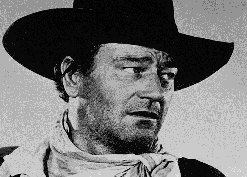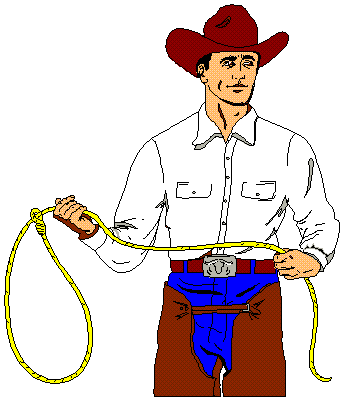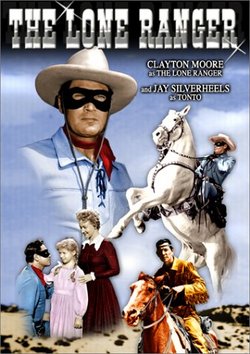 Another response to Adolf Hitler: A True American:
Another response to Adolf Hitler: A True American: Another response to Adolf Hitler: A True American:
Another response to Adolf Hitler: A True American:
A correspondent claims "cowboys" couldn't have influenced Hitler because they didn't exist until Hollywood invented them in the 1920s:
>> Heck, when was the first Western even filmed? <<
The 1900s or 1910s, I'd guess.
>> And didn't the Germans kinda domineer the market when it comes to pre-WW2 motion pictures? <<
I don't think so. I think Hollywood established its dominance pretty early.
>> BTW, with all this talk about cowboys and Indians, can you name me any movies that actually feature cowboys and Indians? <<
Stagecoach. The Searchers. Broken Arrow. Any Lone Ranger movie. Little Big Man. Dances with Wolves. Back to the Future, Part 3. Spirit: Stallion of the Cimarron. If you want more, I could read them off the list I've posted.
Most of them are little-known because they weren't very good. That doesn't negate their cultural influence. People watched these movies endlessly in theaters and then on TV. They influenced the creation of dozens, maybe hundreds, of Western TV shows with the same themes.
>> Don't most of those Western movies involve cowboys and (white) outlaws with no Indians ever showing up in them at all? <<
Maybe, but there were enough movies with Indians in them. And even if Indians didn't show up, characters would refer to them as the evil "other," thus establishing the good-white-Manifest Destiny theme implicitly.
>> At any rate, were there even any cowboy and Indian movies available in Hitler's days? <<
Sure. But I didn't say the movies influenced Hitler. I said Karl May's books did.
>> I bet that guy didn't even bother reading any books or a newspaper for that matter. <<
Hitler read May's books in childhood, according to several sources.
>> The term "Cowboy" was invented in Hollywood <<
Says who? Your entire message appears to be predicated on this statement, but you don't cite a source for it. So your entire message is speculative at best.
Here's a fact for you. According to my dictionary, "cowboy" was slang for "one of a band of loyalist guerrillas that operated between the British and American lines, mostly in Westchester County, New York, during the Revolutionary War." So the term dates to 1775, if not before. So much for your so-called research.
My dictionary also describes a cowboy as anyone who performs rodeo-style stunts—i.e., riding, roping, shooting, and so forth. That would include everyone from Buffalo Bill to the early leaders of the wagon trains, who did the riding and shooting even if the settlers didn't. Too bad you didn't use as complete a dictionary as I did, eh?
>> historically there never were any cowboys, they were ranch hands. <<
The basic definition of "cowboy" is a ranch hand. Whether the term existed in the 1800s doesn't matter since ranch hands, lawmen, pioneers, and other variations of the cowboy archetype existed then.

"Cowboy" dates to 1623
But the term did exist. Let's crack open a few (online) dictionaries to prove my point:
Cambridge International Dictionary of English
cowboy, cowgirl, cowhand (FARM WORKER)
noun [C]
a person employed, esp. in the western US, to take care of cattle, usually on a horse, or a similar character in a film
The ranch employed ten cowboys.
He became famous as a cowboy in the movies.
He was wearing cowboy boots and a cowboy hat.
I don't much like cowboy films/movies.
We gave the twins matching cowboy and cowgirl outfits (=clothes) for their birthday.
cowboy (DISHONEST PERSON)
noun [C]
INFORMAL
someone who is not honest, careful or skilful in their trade or business, or someone who ignores rules that most people obey and is therefore not considered to be responsible
Those builders are a bunch of cowboys -- they made a terrible job of our renovations.
My first job was with a firm of cowboy solicitors.
Merriam-Webster Online
Main Entry: cow·boy
Pronunciation: -"boi
Function: noun
Date: 1623
1 : one who tends cattle or horses; especially : a usually mounted cattle-ranch hand
2 : a rodeo performer
Wordsmyth
Syllables: cow-boy
Part of Speech noun
Pronunciation kau boy
Definition 1. a mounted cattle herdsman employed by ranches of the western United States.
Definition 2. a man who is skilled in riding horses and roping, esp. one who competes in rodeos.
Definition 3. (informal) a man who is arrogantly or foolishly heedless of danger, as in difficult or complex situations, and who enjoys demonstrating his masculinity.
The American Heritage Dictionary of the English Language: Fourth Edition. 2000.
cowboy
SYLLABICATION: cow·boy
PRONUNCIATION: kouboi
 NOUN: 1. A hired man, especially in the western United States, who tends cattle and performs many of his duties on horseback. Also called cowman, cowpoke, cowpuncher, Regional vaquero, Regional waddy. See Regional Note at vaquero. 2. An adventurous hero. 3. Slang A reckless person, such as a driver, pilot, or manager, who ignores potential risks. also called regionally Regional buckaroo.
NOUN: 1. A hired man, especially in the western United States, who tends cattle and performs many of his duties on horseback. Also called cowman, cowpoke, cowpuncher, Regional vaquero, Regional waddy. See Regional Note at vaquero. 2. An adventurous hero. 3. Slang A reckless person, such as a driver, pilot, or manager, who ignores potential risks. also called regionally Regional buckaroo.
Comment: Given all this readily available information, your claim that Hollywood invented the term "cowboy" is hysterical. I didn't know moviemakers were around in the year 1623. Or maybe you meant some obscure 17th century town in England called Hollywood? Pray tell.
The definitions cover a ranch hand, a rodeo performer, a Western film star, a macho man, and anyone who acts recklessly. Put them all together and you have the rough outline of the cowboy archetype. We've been talking about the archetype, broadly defined, not the term, narrowly defined.
See Old West vs. Old Europe for someone who understands the cowboy archetype and has correctly applied it to George W. Bush. Bernstein has explained why stupid, myopic Americans love the cowboy. Alas, he's failed to explain how hypocritical, immoral, and bad the cowboy (the archetypal cowboy, that is) really was.
By the way, I was trained as a professional librarian. I have a master's in library science. How about you? When you can do research as well as I can, I'll be the first to let you know.
"Cowboy" is only a ranch hand?!
>> Hollywood's cowboys, who were called ranch hands in real life, are strictly associated with the cattle drives from Texas to Kansas between 1870 and 1890. <<
Again, says who? I say Hollywood's cowboys are loosely associated with any Western person who ever rode a horse, wore a hat, and drew a gun.
>> The first real Western was The Great Train Robbery (1903), about 10 minutes in length. <<
Ah, just as I thought. The 1900s.
>> At any rate, since there were no cowboys until 1929, when Hitler was already 40 years old, how could he have played cowboys and Indians as a kid? <<
Easy. The term "cowboy" is much older than you think. If it weren't, Hitler could've played "horse-riding, gun-wielding lawmen and Indians" as a child. If we later labeled the game "cowboys and Indians" for brevity's sake, it doesn't change what Hitler played.
>> The first movie definitely involving Indians was shot in 1914, Squaw Man, The Adventures of Buffalo Bill, 1917, and The Halfbreed, 1919. <<
Thanks, I'll add them to my ever-growing list.
>> At any rate, I can't locate any movie that features both cowboys and Indians, so it's not clear to me where this "cowboys and Indians" concept even stems from. <<
It stems from associating the word "cowboy" broadly with all types of ranch hands, lawmen, pioneers and other variations of the cowboy archetype.
>> Westerns generally involve either cowboys or Indians but not a combination of the two. Keep in mind that the wagon train people were never referred to as cowboys period, they were pioneers or early settlers. <<
You keep in mind that we refer to Western movies as "cowboy and Indian" movies regardless of what the characters in the movies called themselves. The same applies to Western pulp fiction such as May's books.
>> Karl May's stories definitely didn't involve any cowboys since the author was long dead (1912) before the term "cowboy" was even invented 17 years later, and don't mention any cattle ranches either. <<

Several months ago I said Shatterhand, the Lone Ranger, and other lawmen fit the cowboy archetype. Unless you show a better understanding of this archetype than you have so far, I'm not planning to repeat myself.
Here, read some quotes from people who get the point (emphasis added):
The Strange Life and Legacy of Karl May
By Danica Tutush
Old Shatterhand was modeled to be a German superman cowboy who made his American counterparts look like bumbling fools or brutal thugs.
Cowboys und Indians: Karl May's Teutonic American West
By Ben Novak
More than two hundred cowboy and Indian clubs, boasting more than fifty thousand members, flourish in Germany, actively celebrating Karl May's version of the American West.
Shatterhand fits the archetype
So May's vision includes characters we call "cowboys" today, regardless of what they called themselves. I thought that was obvious, but apparently not. Now I've made it obvious.
Again, it doesn't matter if the term "cowboy" or the term "superman" existed when May wrote his books. These are labels we apply today to the concepts in his books. The concepts influenced Hitler regardless of what terms he used to identify them.
>> You need to do some basic reseach before you develop all these goofy theories. It only took me a few minutes to verify these dates and movie titles. <<
Apparently, you need to do some research into the history of cowboys, since it took me about 15 seconds to get my dictionary and prove you wrong. Better luck next time.
>> I don't know why you don't check this stuff out before you start speculating on it. <<
Stop wasting your time researching the history of the word "cowboy" and start researching the history of romanticizing the Old West. Whether it involves pioneers, settlers, lawmen, gunmen, ranch hands, or cowboys, that's the issue.
|
. . . |

|
All material © copyright its original owners, except where noted.
Original text and pictures © copyright 2007 by Robert Schmidt.
Copyrighted material is posted under the Fair Use provision of the Copyright Act,
which allows copying for nonprofit educational uses including criticism and commentary.
Comments sent to the publisher become the property of Blue Corn Comics
and may be used in other postings without permission.